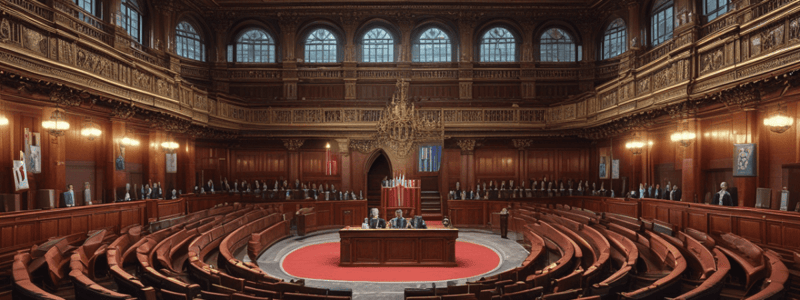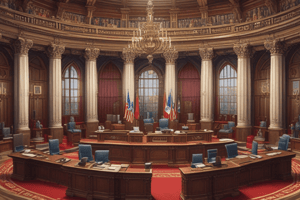Podcast
Questions and Answers
Which of the following is a potential advantage of a presidential system?
Which of the following is a potential advantage of a presidential system?
- It provides greater stability by balancing power between branches of government. (correct)
- It lacks continuity in government policies due to short tenures of leaders.
- It can lead to gridlock and ineffective decision-making.
- It promotes political instability due to frequent changes in government.
What is a potential disadvantage of a presidential system?
What is a potential disadvantage of a presidential system?
- It allows for frequent changes in government, leading to instability.
- It can lead to gridlock and inefficiency due to political polarization and complex decision-making processes. (correct)
- It lacks flexibility and adaptability to changing public opinion or emerging issues.
- It promotes accountability by making the head of government directly responsible to the legislature.
Which of the following is an advantage of a parliamentary system?
Which of the following is an advantage of a parliamentary system?
- It allows for greater flexibility and adaptability to changing public opinion or emerging issues. (correct)
- It reduces the likelihood of gridlock and ineffective decision-making.
- It provides greater stability by preventing frequent changes in government.
- It promotes accountability by making the head of government directly responsible to the people through elections.
What is a potential disadvantage of a parliamentary system?
What is a potential disadvantage of a parliamentary system?
Which of the following statements correctly compares presidential and parliamentary systems?
Which of the following statements correctly compares presidential and parliamentary systems?
Study Notes
Introduction
The systems of governance across various countries differ significantly based on their unique histories, cultures, and socio-economic structures. Two primary forms of government systems are the presidential system and the parliamentary system. These systems play a vital role in determining how power is distributed, exercised, and held accountable within a country's political framework. In this article, we will explore the advantages and disadvantages of both systems and compare them to provide a comprehensive understanding of these distinct approaches to governance.
Presidential System - Advantages
A presidential system is a form of government in which a president is both the head of state and the head of government. This system has several advantages:
Separation of Powers
One of the key advantages of a presidential system is the principle of separation of powers between the legislative, executive, and judicial branches of government. This ensures a balance of power and prevents any one branch from dominating the others.
Accountability
In a presidential system, the president is directly elected by the people, which can lead to a more accountable form of government. This is because the president is more likely to be responsive to the will of the electorate, as they are directly responsible for their re-election.
Stability
A presidential system can provide greater stability, as the balance of power between the branches of government can prevent the emergence of a dominant political faction. This can lead to a more stable political environment and reduce the likelihood of political instability.
Presidential System - Disadvantages
Despite its advantages, a presidential system also has some disadvantages:
Gridlock
In a presidential system, the dual nature of the president's role can lead to gridlock, as the president may not be able to pass legislation through Congress due to political polarization. This can result in a lack of effective decision-making and policy implementation.
Inefficiency
The complex nature of a presidential system can lead to a more inefficient form of government, as the president may spend a significant amount of time on political maneuvering and negotiating with Congress. This can divert resources and attention away from addressing pressing issues and serving the public.
Parliamentary System - Advantages
A parliamentary system is a form of government in which the executive branch is responsible to the legislative branch, and the head of government is typically the leader of the political party with the most seats in the parliament. There are several advantages to this system:
Accountability
In a parliamentary system, the head of government is directly accountable to the legislative branch, which can lead to a more responsive and accountable form of government. This is because the head of government relies on the support of the legislature to maintain their position in power.
Flexibility
A parliamentary system allows for greater flexibility and adaptability, as the government can change more easily when there is a shift in public opinion or when a new issue arises. This can lead to a more dynamic and responsive form of government.
Parliamentary System - Disadvantages
Despite its advantages, a parliamentary system also has some disadvantages:
Instability
In a parliamentary system, there can be more frequent changes in government due to shifts in public opinion or political alliances. This instability can lead to a more volatile political environment and reduce the ability to address long-term policy issues.
Lack of Continuity
The short tenure of prime ministers and cabinets in a parliamentary system can lead to a lack of continuity in government policies and decision-making processes. This can result in inconsistent approaches to addressing issues and serving the public interest.
Comparison of Presidential and Parliamentary Systems
In comparing both systems, it is essential to consider their unique advantages and disadvantages within specific contexts. Some key points of comparison include:
Flexibility vs. Stability
Presidential systems tend to offer greater stability but may be less flexible than parliamentary systems. The balance of powers between branches of government in a presidential system can reduce political instability, but this stability may come at the cost of slower decision-making processes and less adaptable policies. On the other hand, parliamentary systems can be more flexible due to the ability to change governments quickly, but this flexibility comes with the tradeoff of potential instability.
Accountability vs. Responsiveness
Both systems aim to promote accountability within government, but they do so through different means. Presidential systems rely on direct elections to hold the president accountable to the people, while parliamentary systems focus on holding the head of government accountable to the legislative branch. In terms of responsiveness, parliamentary systems are generally considered more responsive due to their direct relationship between the head of government and the legislature.
Conclusion
Understanding the advantages and disadvantages of presidential and parliamentary systems is crucial for evaluating how well these forms of governance suit various countries' specific contexts. By considering factors such as political stability, accountability, efficiency, and flexibility, we can gain insights into which system may be more appropriate for addressing the unique challenges faced by individual nations. Ultimately, a successful government system depends on its ability to balance the needs of its people with the complexities of managing power and implementing effective policies.
Studying That Suits You
Use AI to generate personalized quizzes and flashcards to suit your learning preferences.
Description
Explore the advantages and disadvantages of presidential and parliamentary systems of government. Learn about separation of powers, accountability, stability, flexibility, gridlock, inefficiency, instability, and lack of continuity in these two distinct governance systems.




